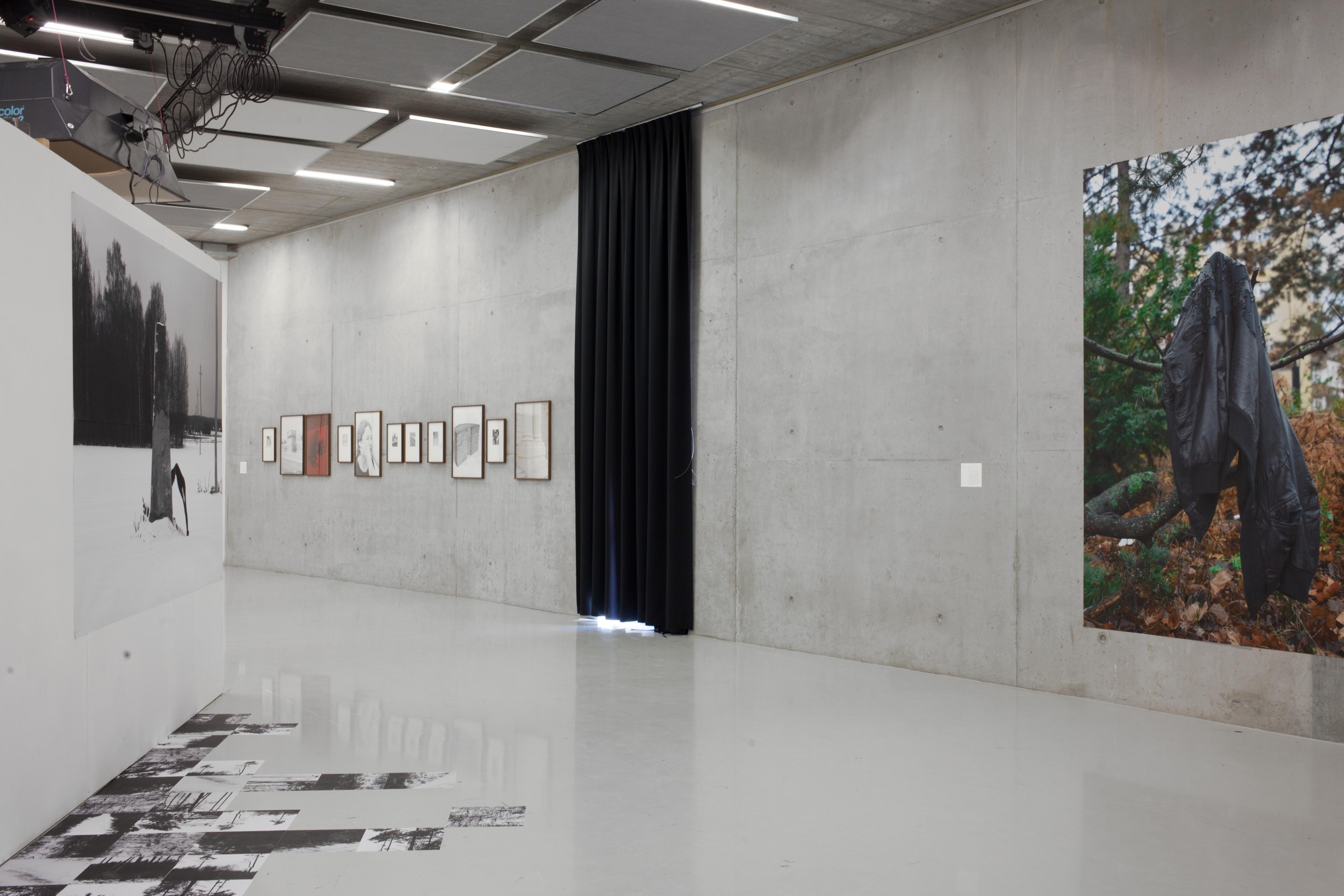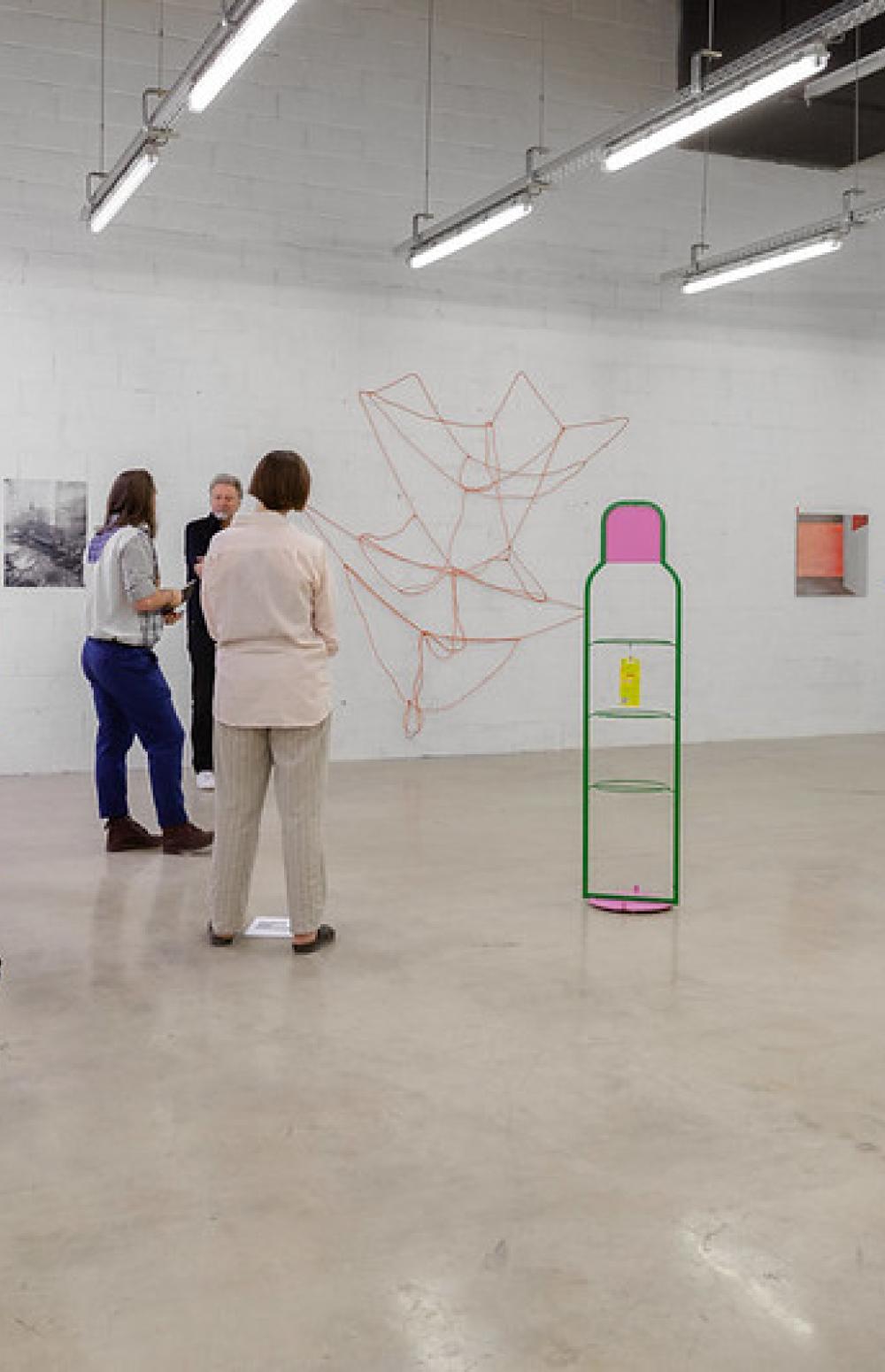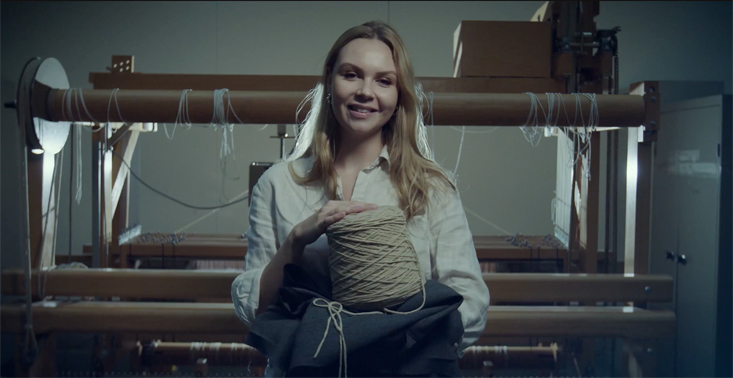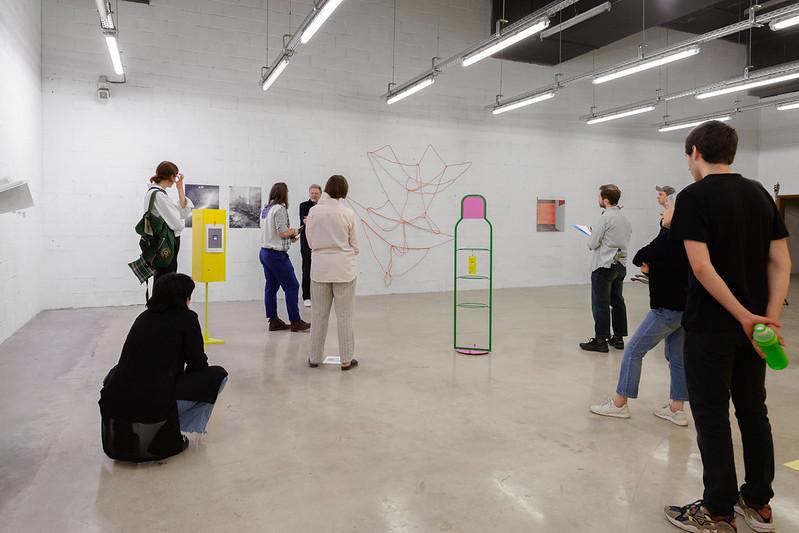LUCA School of Arts offers 5 professional bachelor degree programmes and 8 academic bachelor degrees with 29 different specialisations. Dutch is the official language of instruction. Consequently, all of our bachelor's programmes are completely organized in Dutch. The required level of Dutch is level B2.
Interested in a bachelor's degree at LUCA? Fill out the form below to apply for a study at LUCA School of Arts. The application form will guide you through every step of the way.
ADMISSION REQUIREMENTS
Admissions Requirements might differ depending on the chosen education programme: Academic Bachelor or Professional Bachelor. We make a distinction between Diploma Requirements, Residence Requirements, Language Requirements and Learning Account Requirement.
For the Academic Bachelor’s degree programmes (Audiovisual Arts, Visual Arts, Music, Drama and Product Design) or the Professional Bachelor's degree programmes in ‘Visual Design’ and ‘Audiovisual Techniques: Film-TV-Video’ it is also mandatory to pass the Artistic Aptitude Test.
Diploma Requirements
If an international or Belgian student's secondary-school diploma is obtained outside Flanders, LUCA School of Arts may still grant admission to a bachelor's programme if the diploma grants access to similar university studies in one’s home country.
- Students with a diploma obtained in a country that signed the Lisbon Recognition Convention are admitted if the obtained diploma provides access to higher education in the country in question.
- Students with a diploma obtained in a country that did not sign the Lisbon Recognition Convention can be admitted if the obtained diploma provides access to equivalent higher education in the country in question. The permission in this case depends on an additional test of the programme’s competences.
Certified or legalized copies: what does it mean?
Before a public document (like a diploma) can be used in a country other than the one where it was issued, the origin of the document must be authenticated.
The legalisation is done in the country where the document was issued. There are different procedures to authenticate a document. The procedure to follow depends on the country where the document was issued. Please always check the website of the Belgian Ministry of Foreign Affairs: http://diplomatie.belgium.be/en/services/legalisation_of_documents/
There are several ways to authenticate your documents, but core element is always that the certification or legalisation is being done in the country where the diploma or documents were issued.
- You can have documents certified by the educational institution that issued the original documents. You can ask your university to issue a new set of original transcripts and either send these to us yourself (preferably in a closed university envelope) or have the university send them to our Admissions Office
- You can ask the university who originally issued the documents to make a certified copy of your diploma/transcript/diploma supplement. A ‘certified’ copy is a copy made by an individual or institution authorised to do so, in this case, the academic institution or university that granted your transcripts/diploma/supplements. They stamp the copy, thereby attesting that it is a true copy of the original document;
- If the country where the diploma was issued has signed "The Convention Abolishing the Requirement of Legalisation for Foreign Public Documents" (1961), in that case the copy of your diploma or transcripts has to bear the "Apostille". For more information on this convention, to see whether the country where your diploma was issued has signed the convention and to find out who can put an apostille on the copy of your diploma, go to the official website:https://www.hcch.net/en/instruments/conventions/status-table/?cid=41 .
- Legalisation by the Belgian Embassy: http://diplomatie.belgium.be/en/services/legalisation_of_documents
Admission office LUCA School of Arts
LUCA School of Arts
Paleizenstraat 70
B-1030 Brussel
Belgium
E: admissions@luca-arts.be
Residence Requirements
Students with a foreign nationality and who successfully passed our admission procedure may need the following documents when coming to Belgium: a visa/entry document, a work permit and a residence permit. Which specific documents you need, and how to apply for them, depends on your situation. Non-EEA nationals will need to follow different procedures depending on the length of stay when they arrive in Belgium. EEA nationals and Swiss nationals do not need a visa (or work permit) to enter Belgium.
Upon arrival in Belgium, you will have to complete your enrolment as student. For an enrolment at LUCA School of Arts it is obligatory that non-EEA students hold a valid visa/entry document or a (Belgian) residence permit. Are you a EEA citizen? In that case your identity card or passport is sufficient.
It will also be mandatory for EEA and non-EEA students to register at the town or city hall of their place of residence in Belgium, as soon as possible. The registration procedure is different for EEA nationals and Swiss nationals and non-EEA nationals, as non-EEA nationals will have to get a residence permit as legal residence document in Belgium.
More information about visa and residence: https://www.luca-arts.be/en/visa-and-residence-permits
For more questions: international@luca-arts.be
Language Requirements
Dutch is the official language of instruction. Consequently, all of our bachelor's programmes are completely organized in Dutch.
Language level
The required level of Dutch to study at LUCA School of Arts is level B2. The following ways to prove your Dutch language proficiency are accepted by LUCA:
- A proof that the applicant has successfully finished one year of full-time secondary education or higher education (or the equivalent of at least 54 credits) in Dutch.
- A certificate which demonstrates that the applicant has at least a B2 proficiency level in Dutch corresponding to the Common European Framework of Reference for Languages (CEFR). We accept the following certificates:
- ITNA language test: The 'Interuniversitaire Taaltest Nederlands voor Anderstaligen' is developed and administered by all members of the Interuniversity Testing Consortium (IUTC): Ghent University, KU Leuven, University of Antwerp and Vrije Universiteit Brussel. An overview of test dates are published here: www.itna.be/testdata
- A certificate of the Staatsexamen NT2 programme II
- A certificate issued by an Adult Learning Centre (in Dutch: CVO or 'Centrum voor Volwassenenonderwijs'), minimum level 3 (richtgraad 3) (final certificate including all modules)
- A certificate CNaVT (Certificaat Nederlands als Vreemde Taal), either type 'Educatief Startbekwaam' (STRT, level B2) or type 'Educatief Professioneel' (EDUP, level C1)
- European Baccalaureate with “L1” in Dutch
- International Baccalaureate with “Language A (HL)” in Dutch
Validity of language certificates: the validity of the certificate proving your language proficiency cannot be older than 5 years following the date of issue. If the validity period is expired applicants are strongly encouraged to provide an updated certificate or additional proof that you maintained the level of your language skills since then.
More information on Dutch Language Preparation can be found here.
Learning Account Requirement
In 2009, the ‘learning account’ came into effect in Flemish higher education. The idea is to encourage you to make an informed choice of study. It should also stimulate institutions to monitor their students’ study progress. The learning account system is relevant to degree-seeking students only.
How does it work?
The learning account is a virtual backpack with credits. As of academic year 2008-2009, everyone (including students already following higher education) receives 140 credits upon their enrolment in Flemish higher education. Each time you enrol in a course component, credits are taken from your backpack. If you pass this particular course component, these credits are accumulated again. If you do not pass or are allowed to pass a course component after deliberation, these credits are deducted from your learning account for good.
The learning account is for anyone who has a diploma contract for initial training (bachelor and master) and for any enrolments with a credit contract.
If you are a higher education student for the first time this academic year, you can benefit from a special regulation should you wish to re-orient. Re-orientation means that you change to another course during the academic year. If you do so before 1 December, you'll regain all the credits used. If you do so between 1 December and 15 March, you'll regain half of them. After 15 March, you'll receive none of the credits back.
Bonus of 60 credits
The path from secondary to higher education is not always strewn with roses. That is why we have incorporated a measure to remedy this. The first 60 credits you gain are doubled.
Already a student?
Have you already studied in higher education? Just like new students, you will be given a ‘starter backpack’ with 140 credits. The first 60 credits you achieve will be doubled for you as well. We do not take your past studies into account. However, each institution independently defines the date until when changes in enrolments have consequences for the learning account.
Finished your bachelor's degree?
After you have obtained your bachelor degree, you will retain your learning account. If you obtain a master degree, the starting capital of 140 credits is deducted. If your study path has proceeded without any problems you will be left with 60 credits. If you end up with a learning account below 60, your learning account will be accumulated again to 60 at a rate of 10 credits per academic year.
No more credits left in your account?
If you don't have any credits left in your learning account, the institution may refuse to enrol you or ask you to pay a double enrolment fee. In certain cases you can accumulate your learning account again.
Status of your learning account
You can consult the status of your learning account, using your electronic ID card or a federal token on the student portal.
If as a first-time student you wish to change courses (re-orient), it is very important for you to closely monitor withdrawal from the first course and enrolment in the new course. As mentioned earlier, strict dates determine whether or not you will regain your learning account. Students who wish to make changes to their course programme during the academic year or who wish to withdraw are also advised to closely monitor this. The institution itself defines the date until when changes will affect the learning account.
Via the student portal you can monitor all these changes yourself. If you notice that a change or withdrawal is not indicated (correctly) on this website, you are advised to contact your college or university as soon as possible to rectify this.

ENROLMENT OR REGISTRATION
The application and enrolment procedure at LUCA School of Arts consists of two or three steps depending on the chosen education programme. First you will have to submit an online Admissions application in which you will be asked to upload certain documents required for the Admissions’ diploma and language check (step 1). For the Academic Bachelor’s degree programmes and the Professional Bachelor's degree programmes in ‘Visual Design’ and ‘Audiovisual Techniques: Film-TV-Video’ it is mandatory to succeed for the Artistic Aptitude Test (step 2). This step does not apply to the Professional Bachelor's degree programmes in 'Audiovisual Techniques: Photography', 'Construction Technology' and 'Interior Design'. For these programmes you can register without test, but only if the diploma, language and learning account requirements are fulfilled. More information on the Admissions Requirements can be found here.
Interested in a bachelor's degree at LUCA? Fill out the form below to apply for a study at LUCA School of Arts. The application form will guide you through every step of the way.
Did you pass the Artistic Aptitude Test?
In that case you will find the link to the final and binding registration (step 3) in the e-mail including your result and Certificate of Admittance. In case that you cannot find this e-mail, please contact the Admissions Officers of your campus.
Did you succeed for an Artistic Aptitude Test before?
The result of an Artistic Aptitude Test is valid for a first enrolment in the next academic year X or the subsequent academic year X+1. Did you succeed for an Artistic Aptitude Test before and do you want to enrol at LUCA now? Please contact inschrijvingen@luca-arts.be to request the online registration link.
Refusal due to academic progress provisions, late enrolment or participation in a late Artistic Aptitude Test?
In that case an admission for exceptional registration has to be requested to the Vice Dean of Education. Therefore you must use the following form: Admission Exceptional Registration.
The Vice Dean will assess your motivation after it has been checked by the education administration. The approval or disapproval of your request will be sent by e-mail.
Any other questions?
When in doubt about your registration, please contact inschrijvingen@luca-arts.be
(Please mention the campus in which you're interested in the title).
Admissions Application & Deadlines
The LUCA Admissions department will screen your Admissions application in order to decide whether or not you meet the diploma and language requirements to start the chosen bachelor programme. All applicants must submit an online Admissions application using the online registration tool (see above). The following documents are mandatory to be submitted as attachments to your application:
- Certified diploma / degree certificates of your secondary school issued in the national language and mandatory translation of the diploma in case the original diploma is not yet issued in English, French, German or Dutch.
- Certified transcripts of records with grades issued in the national language and mandatory translation of the diploma in case the original transcripts were not yet issued in English, French, German or Dutch
- Proof of Dutch language proficiency
- Copy of your ID card or passport.
- APS certificate (Only for mainland Chinese citizens. Not required at application stage.). More information below:
APS- requirement: All mainland Chinese citizens who are not in the possession of a foreign degree, or have not completed any courses at a university in another country than China, need to go through the APS procedure to obtain the APS certificate in order to apply for a student visa for Belgium. These students cannot get a Belgian student visa without this certificate. Certain categories of students don’t need to go through the APS procedure. We do not require the APS certificate at the time of application. Students should wait for a positive outcome on their application at LUCA School of Arts and only then start the APS procedure. Contact admissions@luca-arts.be for further information.
APPLICATION DEADLINES
- Non-EEA-students, especially those who are not holding a valid residence permit for Belgium/Schengen countries: March 1
- Non-EEA-students with or without a valid residence permit for Belgium/Schengen countries and EEA-students: May 1
- EEA-students, Belgian students with international diplomas, students with a diploma from the French Community and only non-EEA-students with a valid residence permit for Belgium/Schengen countries: September 1 (*)
(*): note to applicants for Music and Drama: applicants who wish the use the last intake deadline of September to apply for Music or Drama are strongly recommended to complete their application before mid-August as the Artistic Aptitude Tests (bachelor level entry) or Master Assessments (master level entry) for these programmes are exceptionally organized in the course of August.
Artistic Aptitude Test
Would you like to start a professional bachelor in Visual Design or Audiovisual Techniques: Film-TV-Video? Or an acadamic bachelor in Audiovisual Arts, Visual Arts, Product Design, Music or Drama? In that case you will need to pass the Artistic Aptitude Test.
The Artistic Aptitude Test in general screens your artistic competence and motivation on the basis of several assignments and a motivation interview. Based on the assignments (which you prepare beforehand or on the day itself), the education teachers review your artistic vision, cultural baggage, creativity and knowledge. Through the motivation interview they want to know how motivated and driven you are. Both are very important to make you feel at home in the education programme and succeed. Please find in the table below all details per education programme.
After having completed your Admissions application you will receive a confirmation mail including the registration link for the Artistic Aptitude Test. Use this link to register for the Artistic Aptitude Test of the chosen education programme. Please note that the following professional bachelor programmes do not organise an Artistic Aptitude Test: Audiovisual Techniques: Photography, Construction Technology and Interior Design.
REGISTRATION
- Registration for the Artistic Aptitude Test is obligatory and is only possible after submitting an Admissions application using this registration form. Only after submitting your Admissions application, a unique link will be received to register for the Artistic Aptitude Test.
- The content and programme of the Artistic Aptitude Test will be sent by confirmation e-mail after registration (and can be found in the table below as well).
- The Artistic Aptitude Test is free of charge.
- The Artistic Aptitude Test results are valid for registration in academic year 2024-2025, but also for registration in academic year 2025-2026.
OVERVIEW ARTISTIC APTITUDE TESTS
The table and links below provide you an overview of all Artistic Aptitude Tests and important information per campus.
| CAMPUS C-MINE GENK | Education programmes: Product Design, Audiovisual and Visual Arts |
| CAMPUS SINT-LUKAS BRUSSELS | Education programmes: Audiovisual and Visual Arts |
| CAMPUS NARAFI VORST | Education programmes: Audiovisual Techniques (Film-TV-Video) |
| CAMPUS SINT-LUCAS GHENT | Education programmes: Visual Arts and Visual Design |
| CAMPUS LEMMENS LEUVEN | Education programmes: Drama and Music |
Final & Binding Registration
After succeeding for the Artistic Aptitude Test, you will receive a Certificate of Admittance (official result) and instructions on how to complete your registration/enrolment at our School of Arts.
Did you succeed for an Artistic Aptitude Test before and do you want to enrol at LUCA now? Please contact inschrijvingen@luca-arts.be to request the online registration link.
For programmes without an Artistic Aptitude Test you will receive a Certificate of Admittance and instructions on how to complete your registration/enrolment at our School of Arts once our Admissions Office has approved that you comply with the diploma, language and learning account requirements.
Students who do not comply with the language requirements but who were successful in passing the Artistic Aptitude Test or the Programme Asessment (motivational questions) receive a conditional admission letter. With this conditional admission letter, you can register at the ILT language centre at the University of Leuven (LUCA is member of the university association of KU Leuven) or any other university language center. More information on language preparation and language preparatory year can be found here.
Registration
Online registration is the easiest way to get registered. However, if you are required to do so by the Admissions/Administration department it may be necessary to take a physical appointment and present yourself to register on campus.
In case of online registration you will receive a link to the final and binding online registration tool (OLI).
You will need to upload the following documents in the OLI tool:
- Certificate of Admittance
- Your Identity Card or your Passport
- Your Belgian student visa type D (for non-EEA students who require a visa for traveling to Belgium)
- Your original diploma/transcripts
TUITION FEES AND ADDITIONAL COSTS
TUITION FEES
|
2024-2025 |
standard 60-credit course |
of which fixed part |
of which variable part |
of which additional study costs* |
|---|---|---|---|---|
|
Non-scholarship |
€ 1416,00 |
€ 288,00 |
€ 13,80 per credit |
€ 300 |
|
With near-scholarship |
€ 888,00 |
€ 288,00 |
€ 5,00 per credit |
€ 300 |
|
With scholarship |
€ 431,50 |
€ 131,50 |
€0 per credit |
€ 300 |
*Additional study costs drama is €400, construction €250 and photography €350
|
2025-2026 |
standard 60-credit course |
of which fixed part |
of which variable part |
of which additional study costs* |
|---|---|---|---|---|
|
Non-scholarship |
€ 1457,00 |
€ 299,00 |
€ 14,30 per credit |
€ 300 |
|
With near-scholarship |
€ 911,00 |
€ 299,00 |
€ 5,20 per credit |
€ 300 |
|
With scholarship |
€ 436,50 |
€ 136,50 |
€0 per credit |
€ 300 |
The tuition fee consists of a fixed part (which every student pays at registration) and a variable part (per registered credit). The total amount of the tuition fee is determined by
- the type of study contract under which you are registered
- the number of credits for which you are registered
- the number of registrations
- your personal statute (scholarship student, non-scholarship student, …)
- your nationality
- the credits on your learning account.
Degree students from EEA countries pay the same tuition fee as Flemish students. In some cases, students from non-EEA countries pay an amount that is considerably higher than the fee for Flemish students (this is the case for music students). If you are coming to LUCA as an exchange student, you do not pay any tuition fees. You will, however, have to pay for your own art materials, photocopies, etc.
|
Example: Schoolyear 2024-2025: You are an EEA student or non-EEA student and you follow a Master in Visual Arts (60 ECTS). You pay €1.116 tuition fee . Schoolyear 2025-2026: You are an EEA student or non-EEA student and you follow a Master in Visual Arts (60 ECTS). You pay €1.157 tuition fee . |
ADDITIONAL COSTS
Besides the tuition fee, each academic year you will also have to pay an additional (material) cost.
This additional cost differs between studio's and fluctuates between €200 and €400 per academic year. More information about the fees and costs can be found in the downloads below.
What is it?
These are predetermined study-related costs and facilities for students that are settled under the form of a flat-rate surcharge. This surcharge varies by programme or major.
Why?
LUCA uses these extra study costs to provide the facilities needed to practise the arts, e.g. loan of photographic and film material, printing service, workshops, etc.
Please note: in addition to these extra study costs and tuition fees, you will also have to pay for individual study and work materials such as a laptop, drawing materials, etc.
Example:
total amount: A student at LUCA thus pays both tuition fees + extra study costs:
A Non-scholarship student (= no right to study allowance from the Flemish government) Fine Arts - majoring in Free Arts campus Brussels pays
In 2024-2025:
€1116 tuition fees + €300 additional study costs : total €1416.
In very exceptional cases, eg. if you only follow course units that do not make use of facilities linked to the extra study costs, you can ask not to pay this costs via:
https://proform.luca-arts.be/student/afwijking-extra-studiekosten
CLICK HERE for all information regarding tuition fees and Master mind scholarship.


